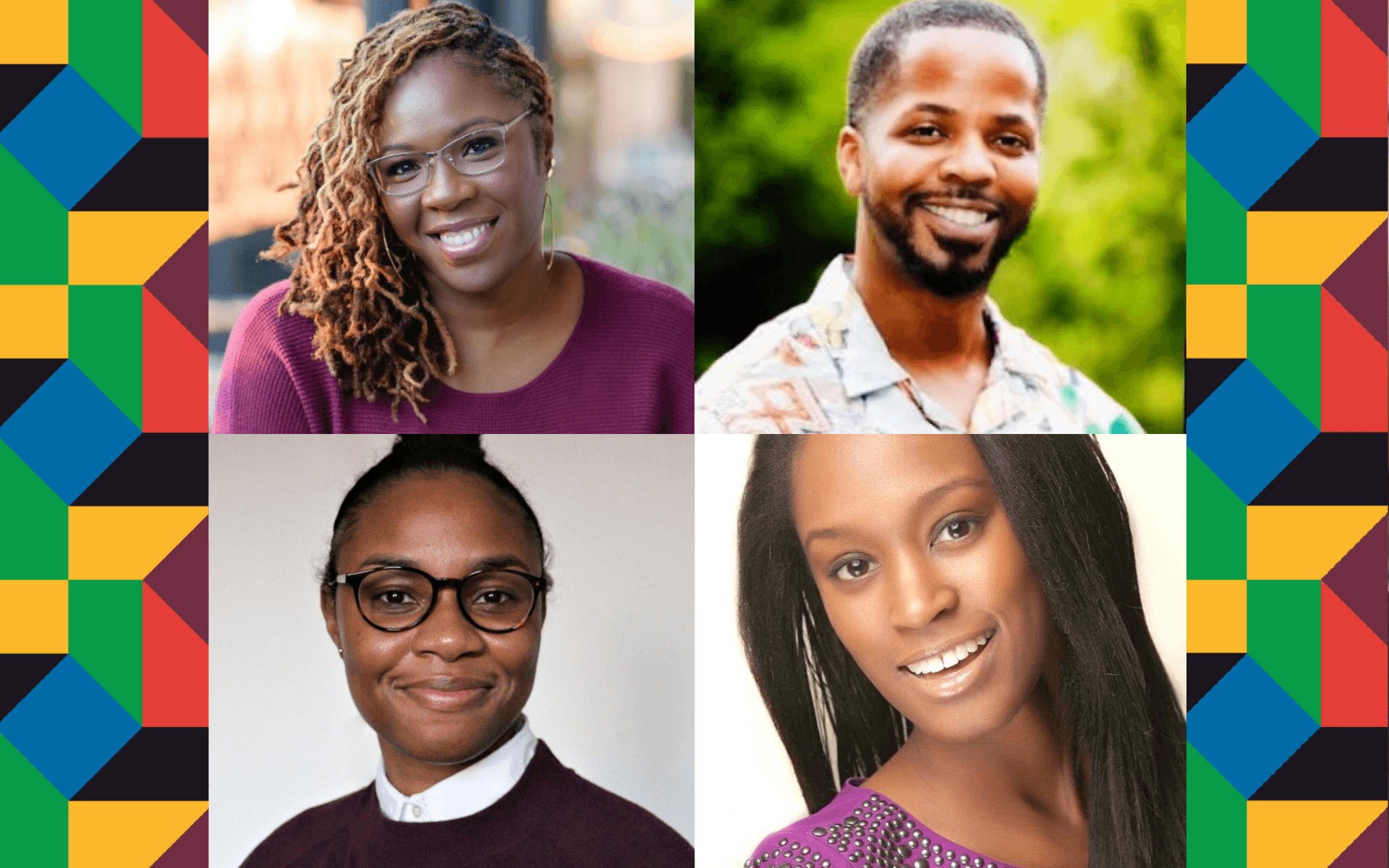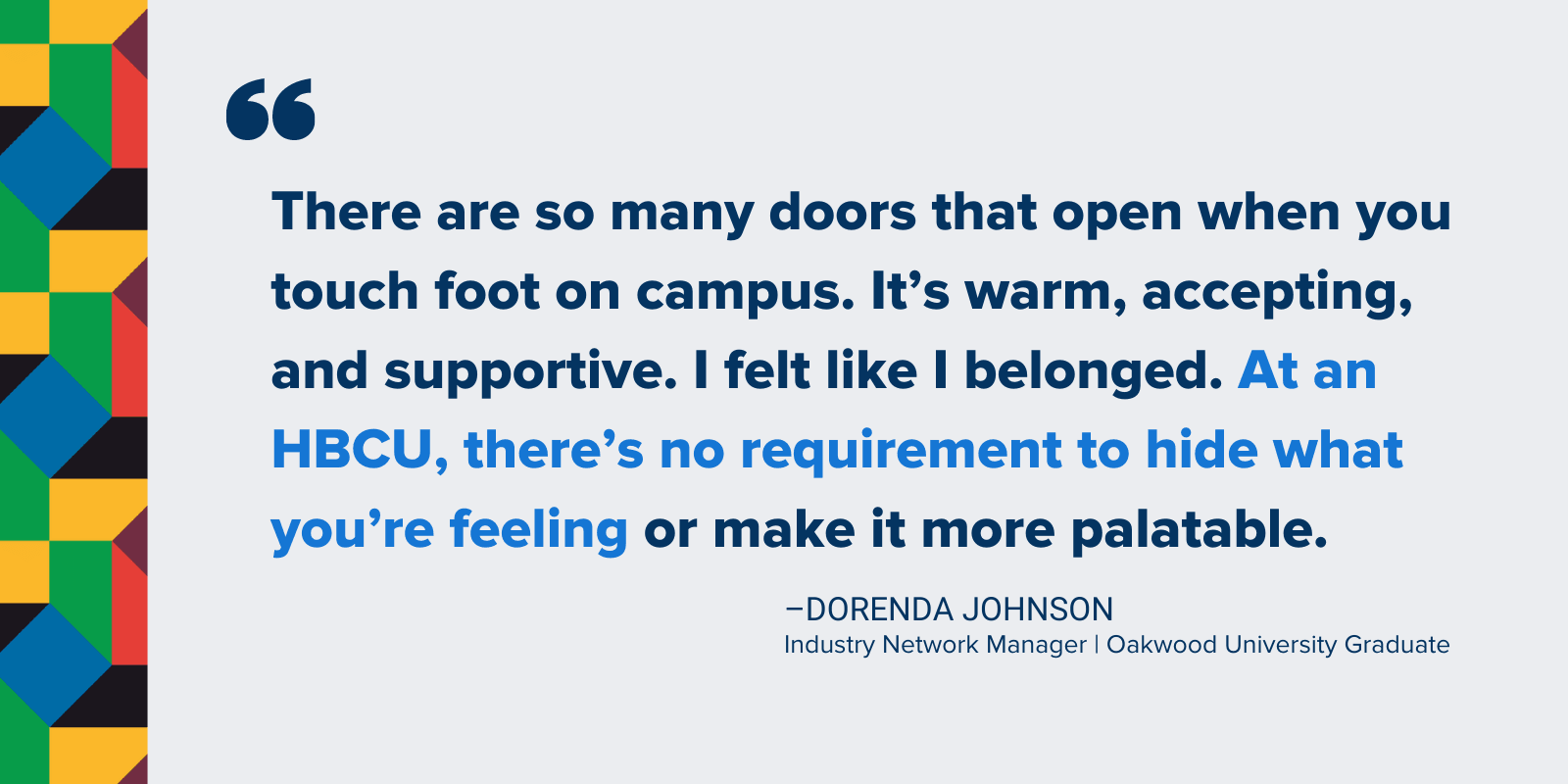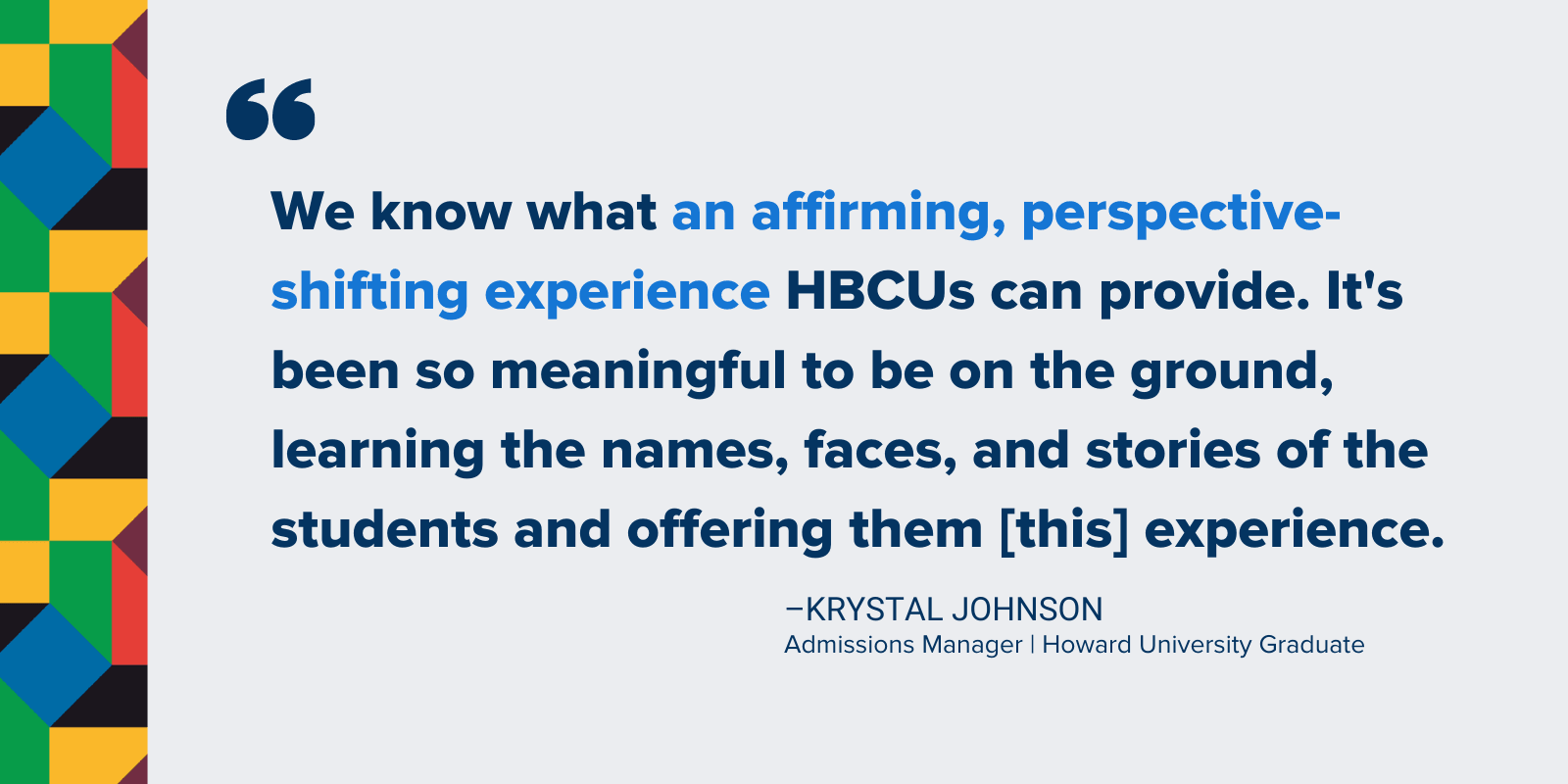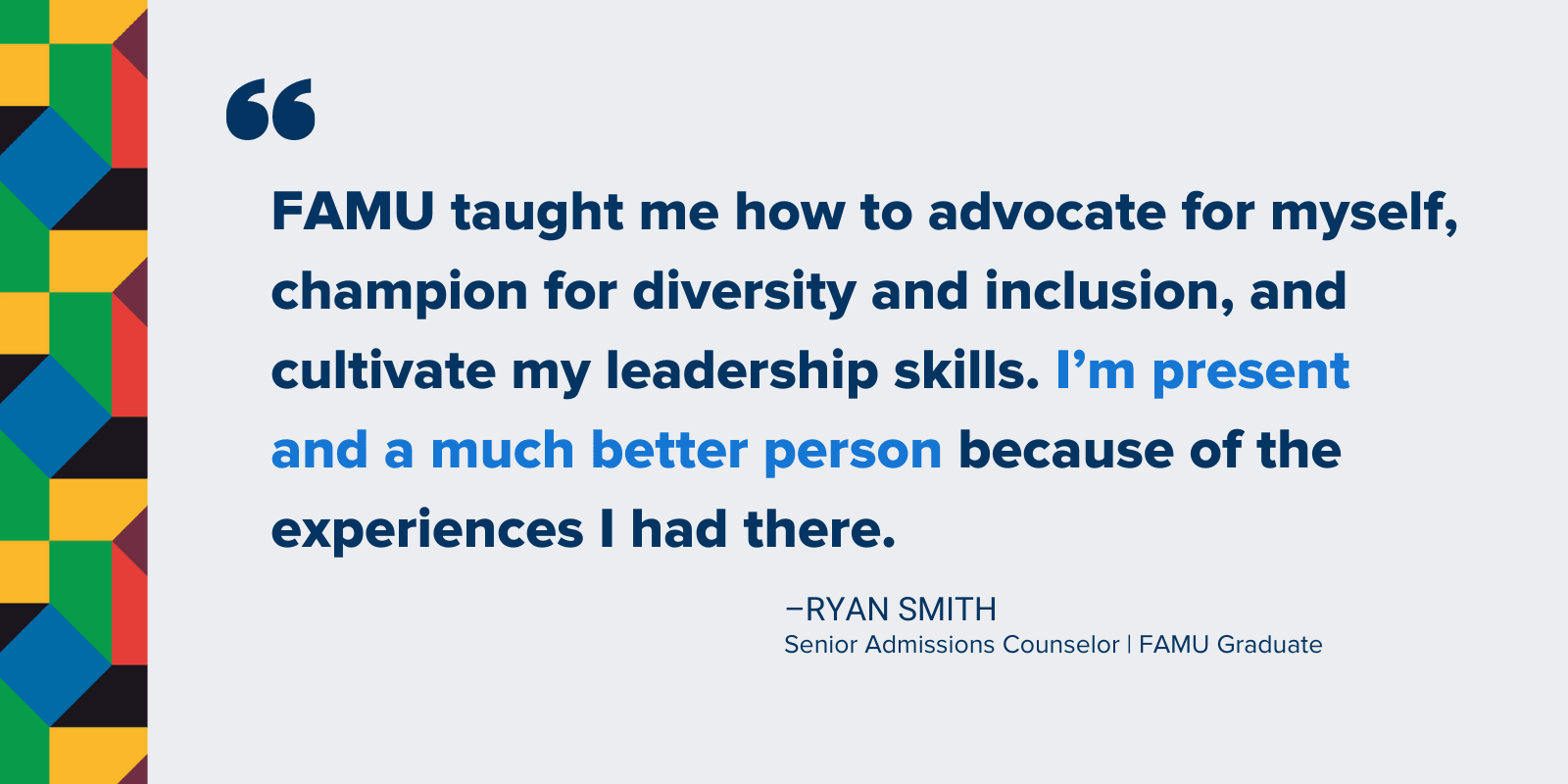Culture
A Place to Discover Our Strengths and Be Ourselves: The Lasting Impact of an HBCU Education
Written by Shaté Hayes | Black Engagement Network (BNet) on Feb 24, 2022
Related content: Diversity And Inclusion, Boot Camps, Life at 2U, Undergraduate Programs

Since the first Historically Black Colleges and Universities (HBCUs) were established in the mid-1800s, they’ve provided a sense of community and belonging for Black students. Preserving nuturing spaces for Black learners is especially important today in light of recent bomb threats against HBCU campuses that have impacted the psychological safety of places where “we could go and just be,” says Ryan Smith, senior admissions counselor for the 2U-powered Morehouse Online program. Ryan personally knows how critical it is to be surrounded by the resilient support network that HBCUs are known for building and sustaining: He was attending the Florida Agricultural and Mechanical University (FAMU) in 1999 when two bombs detonated on campus. “We moved forward by leaning on one another,” he shares.
A proud HBCU graduate myself, I can attest to the lifelong impact shaped by these institutions. I was often one of the only Black students in the classroom, which often made me feel othered. It wasn’t until my mom sent me on a tour of HBCU campuses across the south that I felt a sense of belonging in an educational setting. I could see myself feeling at home on all of the campuses I visited, but I particularly connected with Spelman College, a women’s liberal arts college in Atlanta, Georgia. There, I learned the importance of my voice, servant leadership, and giving back to my community, which have had a profound impact on my work today at 2U.
During Black History Month and throughout the year, BNet hosts a variety of events that focus on cultural education and celebration, retention, and professional and personal advancement. As the portfolio of 2U’s partnerships with HBCUs grows, BNet is committed to amplifying the stories of their history, importance, and impact. We recently hosted a panel, “HBCUs in Action,” that offered 2U employees the opportunity to learn more about HBCUs through the lens of employees who are HBCU graduates and support students in our HBCU programs. I moderated the conversation with Ryan—along with Dorenda Johnson, industry network manager supporting the Netflix Pathways Bootcamp, and Krystal Johnson, admissions manager with Morehouse Online—to learn more about the influence an HBCU education has had on their lives and careers in amplifying HBCUs at 2U.

Thanks so much for joining me, Ryan, Dorenda, and Krystal. Can you start by sharing why you chose your HBCU and what impact the experience had on you?
Ryan (FAMU): My aunt went to FAMU and she heavily recruits everyone in our family, but visiting the campus was a real game changer for me. Everyone immediately felt like family. Looking back, I can say FAMU taught me how to advocate for myself, champion for diversity and inclusion, and cultivate my leadership skills. It’s had an impact not only on my life but also the lives of my family and the people I come into contact with. I’m present and a much better person because of the experiences I had there.
Dorenda (Oakwood University): There’s an Oakwood legacy in my family, so I grew up hearing about everyone’s experiences. There are so many doors that open when you touch foot on campus. It’s warm, accepting, and supportive, and when I went there, I felt like I belonged. In fact, two weeks into Oakwood, I got in a car wreck with my friend. I had to go to the hospital, and when I went back to campus, the professor in my first class asked me, “How are you doing?” I literally still tear up because we as minorities and people of color are never asked that question when we are faced with a requirement to perform. At an HBCU, there’s no requirement to hide what you’re feeling or make it more palatable for people.
Krystal (Howard University): Part of my reason for choosing Howard was that legacy piece, as well. My dad graduated from a segregated high school in Birmingham, Alabama, and afterward spent a few years in Washington, D.C. at Howard. The second reason was a bit more personal. I went to an all-Black Catholic school in Birmingham, and our principal would always tell us, “Remember who you are and whose you are.” When I was in 11th grade, I was selected to be a Congressional page in Washington, D.C. and found myself in a majority white environment, where I had to prove things my community already knows. That experience pushed me to go to an HBCU because it’s a place and an experience that reminds us who we are.

It’s interesting how we all have similar origin stories. Legacy is so important for us all. We also have another thing in common: our support for HBCU programs. How has your HBCU experience informed your career at 2U?
Krystal: There are nine admissions counselors on my team, and five went to HBCUs. We know what an affirming, perspective-shifting experience HBCUs can provide. Building a program is challenging, and it’s been so meaningful to be on the ground, learning the names, faces, and stories of the students applying to Morehouse Online and offering them an experience that we hope will be affirming and perspective-shifting, as well.
Ryan: I can genuinely tell students they’re going to benefit tremendously from the program in both the short term and long term because that’s what it’s done for me. In my undergraduate experience, there were times when I wasn’t sure if I could finish, but people from FAMU would encourage me to move forward. It takes a village, and that’s what an HBCU provides. I get so excited thinking students will go on this journey. To think I may have some type of part in that is amazing. It’s a truly rewarding experience.
Dorenda: The Netflix Pathways Bootcamp is unique. What excites me is how it's designed so everyone can succeed. Students receive one-on-one mentorship directly from a professional at Netflix, instructor recommendations, access to career resources, and opportunities to apply to Netflix positions. The program removes all of the uncertainty students typically experience after graduation by providing them step-by-step guidance on how to start their job search. Once hired, they may end up in an entry-level position, but the salary is not entry level. They start off in a different bracket and they’re able to change what happens in their family tree.

It’s really exciting to see how these programs can have a ripple effect for generations to come. Continuing along that vein, what are you seeing as the impact of 2U-powered HBCU programs on students so far?
Ryan: When speaking with our students and applicants, the first thing we do is unpack their limiting beliefs—things related to their age, finances, and relationships that they may have been dragging around for years. I’m able to help them navigate these and turn their dreams into goals. For example, one student who comes to mind already has a successful career as deputy editor at Complex Magazine but still desired a degree from Morehouse. He shared that he grew up in an Ohio neighborhood where Black people were routinely arrested and accosted. Success for people who look like him was very limited. He wanted to break that cycle in his community and household. Being able to go online was important for him, too, and 2U has provided him that opportunity, as well as a chance to build connections with other Black men in the program.
Krystal: For many Morehouse students, pursuing a bachelor’s online is such a big deal. Prior to entering the degree completion program, they had started college but had to stop for some reason. Maybe their parents got sick, they were experiencing mental health issues, or they had to start working to support their siblings. The reasons they gave for returning are consistent, too, relating to their family and community, circling back to “remembering who you are.” People want to be a part of this experience we’re so proud to be a part of: this family of HBCU alumni.
Dorenda: One student, a computer science senior at Norfolk State University, stands out for me. She had some exposure to coding and tech programs, but no experience in the backend. The Netflix Pathways Bootcamp added this to her resume, and with the skills she learned, she was able to develop a website to bring people together in the pandemic. After the program, she interviewed with Amazon, Pinterest, and Netflix, and was ultimately offered an internship with Disney, which she’ll be starting in the summer. The program is so supportive, and helps bring about tangible results.
Building an HBCU Community Online
Though their education is online, students in 2U-powered HBCU programs are still able to foster that sense of community that’s so important and unique to the HBCU experience. For example, Morehouse Online students, eager for connection, create group chats before class even begins. In the Netflix Pathways Bootcamp, students have opportunities to lead projects, host events, and even rub virtual shoulders in spaces like Gather, an interactive video chat platform.
Through 2U-powered programs, Black learners are pursuing degrees online and experiencing the feeling of belonging that HBCUs can provide. Their access to the HBCU experience isn’t limited by physical proximity—city, state, or country lines—they can aspire to learn from an HBCU anywhere at any time.
~~~
Interested in hearing other stories from HBCU grads? Meet four 2U employees who shared their HBCU Homecoming experience last October.